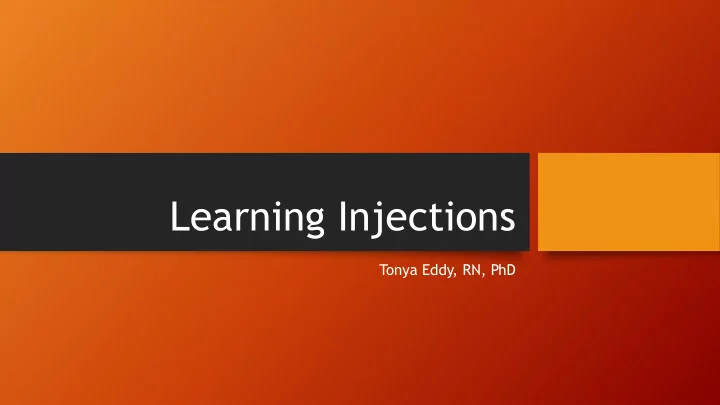

Learning Injections Tonya Eddy, RN, PhD
Current Standard • "Give medications using enteral (oral, sublingual, rectal, and buccal), parenteral (inhalation; intravenous, subcutaneous, and intramuscular injections; topical, transdermal) route of administration appropriate to the drug and the patient."
What to cover today: • Available sites • Needle selection • Syringe selection • Injection technique • Hands-on Practice!
Let’s Start at the Very Beginning… Available sites: frequently depends on medication needed, based on absorption needs. - Intramuscular (IM) sites: ventrogluteal, deltoid, vastus lateralis, rectus femoris (dorsogluteal not recommended) - Subcutaneous (subq) sites: Back of the arms, top of thigh, abdomen, lower back - Intradermal (ID) sites: scapular, ventral forearm
IM Injection sites
Subq sites: • Selection based on absorption needs
ID sites: • PPD’s • Allergy testing
Needle selection • Length: based on type of injection, selected site and size of client • IM = 1-1.5 inches * ID = 0.5 inch or less • Subq = 0.5 – 1 inch • Gauge: • needle diameter is numbered backward: 16 gauge is bigger than 24 gauge • Gauge selection is based on the viscosity of the fluid to be injected • Gauge of needle is what causes discomfort, not length
Syringe selection • Based on amount of fluid to be administered and need for accuracy
Drawing up medication • Cleanse top of vial with alcohol • Inject amount of air equal to amount to withdraw • Without removing needle, tip system and withdraw fluid
Prepare site • Alcohol to intended site • Gloves • Pinch for subq • Stretch for IM • Pull taught for ID
Injection procedure • IM: inject needle at 90 degree angle • Subq: inject needle at 45-90 degree angle depending on subcutaneous layer thickness • ID: inject at 15 degree angle just past bevel • Insert fast, inject slow for dispersion, withdraw fast
Now let’s practice!!!!!
Recommend
More recommend